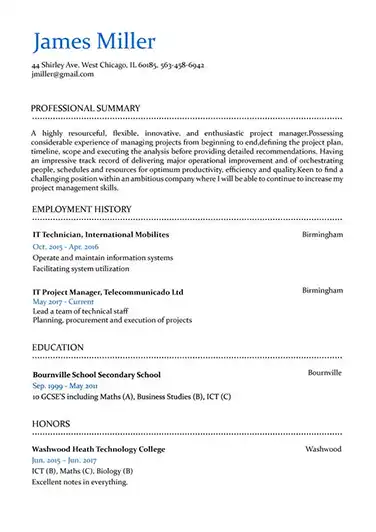 Use This Template
Use This TemplateSimple
Impress hiring managers and schools with a clean-cut, classic resume that makes your strengths and achievements shine.

 Use This Template
Use This TemplateImpress hiring managers and schools with a clean-cut, classic resume that makes your strengths and achievements shine.
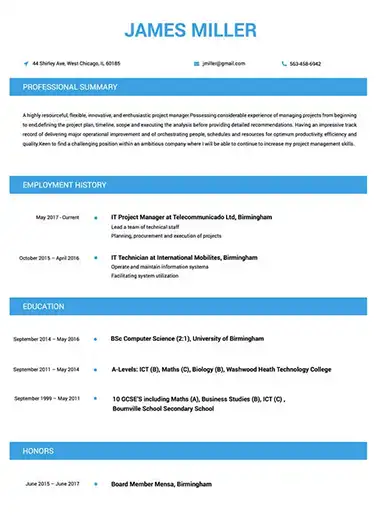 Use This Template
Use This TemplateWorried that your resume won’t be taken seriously as a high school or college student? This resume template’s sharp format frames you as an up-and-coming professional to watch.
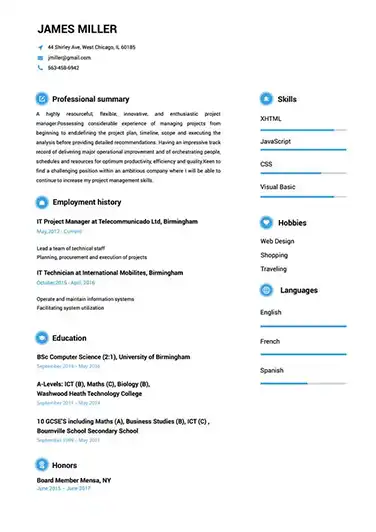 Use This Template
Use This TemplateWith its compelling icons and thoughtful use of color, the Cool resume template is a top choice for anyone looking to create an attention-grabbing resume.
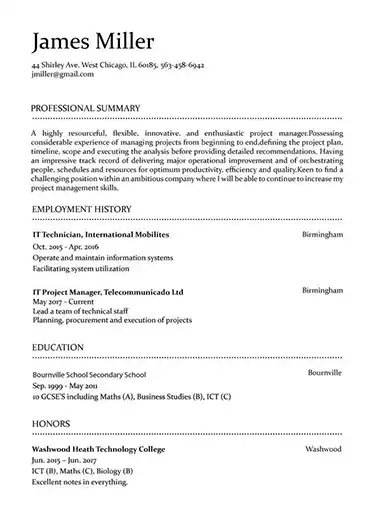 Use This Template
Use This TemplateCharm hiring managers and schools with an ultra-modern student resume that instantly conveys why you’re a candidate worth interviewing.
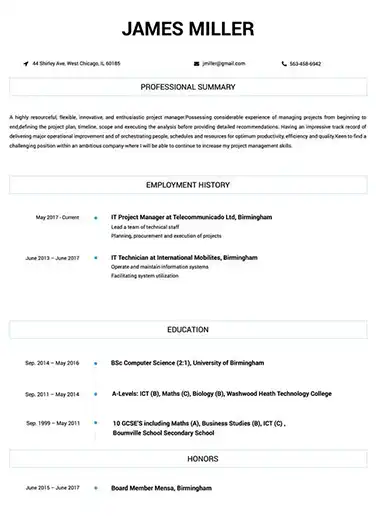 Use This Template
Use This TemplateYou want to be a leader of tomorrow, so shouldn't your student resume look equally forward-thinking? The Contemporary’s eye-catching but refined looks can help you prove you’re a trailblazer.
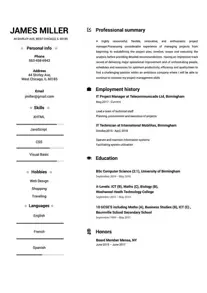 Use This Template
Use This TemplateEffortlessly stand out from the crowd with the Awesome resume template’s unique two-column design and easy-to-read format.
In order to impress schools and hiring managers from the get-go, your resume needs to have a strong opening section. That’s why we strongly recommend including a resume summary at the top of your resume, underneath your contact information.
In the past, applicants for schools or jobs could choose between writing a resume objective or a resume summary. Now, resume experts generally agree that including a resume objective is no longer in line with best practice.
The reason is that a resume objective essentially highlights your goals as a candidate. In contrast, a resume summary conveys how you will be able to support the school or company you’re applying for to meet their goals.
So what exactly is a resume summary, then?
A resume summary is the first major section of your resume. It should succinctly present the case for why you’re an ideal candidate for the position or school you’re applying for.
As it should only be two to four sentences long, you will need to focus only on your most relevant qualities and attributes that make you an attractive candidate or prospective student.
In order to write a strong resume objective or summary, you must make two things crystal clear:
Let’s start with the first part. You should clearly state the purpose of your application. For example, you may wish to:
Next, you must summarize some of the standout qualities and attributes that make you worth considering for the given role. The qualities and attributes you highlight should be directly relevant to the role and should be expanded on in the other sections of your resume. You can mention such things as your:
Try your best to use keywords from the job advertisement or school application to demonstrate that you possess the very qualities and attributes the hiring manager or school is looking for.
Keywords are words or phrases within a job ad or school application that represent what the hiring manager or school are looking for from their ideal candidate. Keywords can include particular competencies, skills, experiences, attributes, studies, and so on.
The work experience section is perhaps the resume section that students dread the most when creating their high school resume or college resume. The reason is that many students don’t know where to begin or may not have held a job before.
The good news is that writing a compelling work experience section really isn’t as difficult as it seems - even if you’ve never been in the working world before. In either case, the most important thing is to make sure your work experience section sounds as relevant as possible to the given job or educational opportunity you are applying for.
If you don’t have any work experience at all, don’t stress! You can instead focus on your:
Spend time brainstorming how to present these experiences in a way that makes them as relevant as possible to the job or school you are applying for.
For example, did you demonstrate any soft or hard skills that will be useful to the role or your studies? Or maybe you achieved something that showcases what an excellent employee or student you will be?
Remember, framing is everything when it comes to your resume! You can do this by integrating keywords that apply to your experiences throughout this section. This will help you to work out what professional experiences will capture the hiring manager or school’s attention.
However, be sure to steer clear of ‘keyword stuffing’! This term is used to describe when people unnaturally add keywords to their resume in order to game the system. Always integrate keywords in a natural-sounding way and only use those that genuinely apply to your skills and experiences.
It’s also important to think about this section as a way to showcase your very best professional achievements in each past position. That is, instead of just listing what you did, focus on conveying how your actions and skills made a positive difference.
In order to make your achievements shine, you will need to:
For each position you include in this section, you will need to state the title you held, the company name, and the dates you worked there.
If you’re unsure of how to format your work experience section, simply use one of our expert-designed resume templates and our resume builder to ensure you get it right. You can also check out the expert tips for writing your work experience section we’ve included within our resume builder.
Just like your work experience section, your resume’s skills section should be as relevant as possible to the position or educational opportunity you are applying for.
Analyze the job ad or school application to identify skill-based keywords. You may wish to print out the job ad or school application and physically highlight these words to make it easier for you to work out which keywords to focus on.
Keep in mind that there are two types of skills to look out for:
You will need to include a balance of both to show that you’re a well-rounded candidate.
Think carefully about which ones are most applicable to your skillset and the job or school at hand, and list 6 to 8 of the most relevant ones in this section.
Don’t forget you will also need to integrate skills throughout your work experience section too.
If you’re finding it hard to come up with relevant skills to add to your high school or college resume, don’t worry. Our resume builder has hundreds of examples of skills you can simply click and add to your resume.
Again, if you want to see how to effectively format this section, check out one of our many resume templates.
Your education & coursework section is one of the most important sections in your high school resume or college resume.
Even if an application does not specifically ask you to share your educational background on your resume, it is generally expected that you will. After all, your studies help to paint a picture of your knowledge, skills, interests, and academic abilities.
As you can see from our library of resume templates, there are a few different ways that you can format your education & coursework section. That said, the general format of this section is as follows:
[High School or College Name]
[Dates attended]
[Subject studied (optional)]
If you want to guarantee you don’t make any formatting errors, just use our resume builder to create your resume!
Want to take your student resume to the next level? Adding an awards & achievements section is an easy way to capture attention.
Before you say, “But I don’t have any awards or achievements!” take a moment to think back on your studies so far. Chances are that you have much more to highlight than you first realize. Here are a few ideas to get you thinking:
So how can you correctly format this section of your resume?
You can list each award or achievement, along with the date you received/achieved it and any other specifics that would help the person reading it better understand why the award or achievement is relevant.
If you are short on space, you can feature your academic awards and achievements in your education & coursework section instead.
Take a look at the following tried-and-tested resume examples and samples for inspiration.
When you’re ready to make your own impressive high school or college resume, our state-of-the-art resume builder will guide you every step of the way.